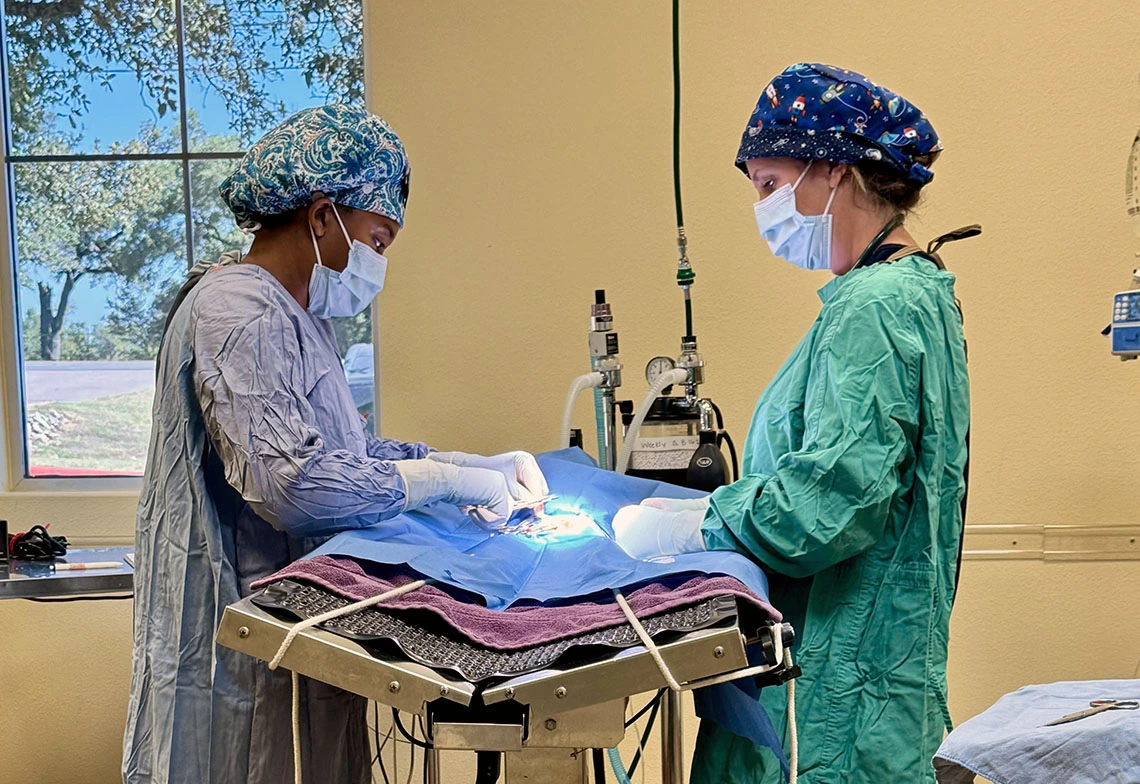Clinical Year Courses

The University of Arizona and premier practices will participate in the clinical education of career-ready veterinarians. Training during the clinical year will involve rotations through a vast network of clinical sites. During these rotations, students will be exposed to routine and diseased animals in various clinical settings. Additionally, students will gain experience in all aspects of patient care and client communication, both in general and specialty veterinary facilities.
Core Rotation Requirements
Students will work under supervised clinical instruction in either Large animal (Equine, Food Animal Species) or Small animal (canine, feline, avian/exotic/pocket pets) medicine and surgery at selected high-quality private general practices. Students will see various cases and actively participate in their diagnostic and therapeutic management, including documentation of findings and care in problem-oriented medical records and the performance of clinical procedures.
Supervised clinical instruction in specialty practice (equine, food animal, canine, feline, lab animal, exotic, and zoological) medicine and surgery in selected high-quality specialty practices. Instruction will take place in practices with board-certified veterinary specialists. Students see a wide variety of cases and are active participants in their diagnostic and therapeutic management, including documentation of findings and care in problem-oriented medical records and the performance of clinical procedures. Students are exposed to a wide variety of cases with instructive pathophysiological learning opportunities.
Students are active participants in the diagnostic and therapeutic management of a wide variety of cases with instructive pathophysiological learning issues requiring timely medical and/or surgical management in veterinary emergency and critical care situations.
Students will work under supervised clinical instruction in busy community shelter practice's medical and surgical areas. Students perform medical, dental and surgical treatments for the benefit of animals owned by the shelter. Arizona CVM faculty work with the shelter medical and surgical teams to supervise students. Students perform physical examinations on dogs and cats and discuss their findings with Arizona CVM faculty, shelter veterinarians and staff.
Students are intimately involved in providing medical, surgical and preventive care to shelter animals. Students are involved in preparing and performing elective surgeries (such as ovariohysterectomy, orchiectomy, and dentistry) on dogs and cats under the supervision of Arizona CVM faculty, shelter veterinarians and staff. Students participate in discussions and/or demonstrations regarding animal behavior problems and potential solutions. Students participate in medicine and surgery rounds. Students make formal rounds of presentations to other students and staff during the course and prepare a presentation relevant to the shelter experience with the course director's approval for presentation at rotation end.
The course comprises hands-on medical and surgical care of shelter-owned animals, lectures, self-study, case write-ups and presentations and team-based exercises.
This rotation provides a comprehensive understanding of necropsy procedures, diagnostic pathology, and ambulatory large animal medicine and surgery.
Students will gain hands-on experience in various diagnostic procedures and participate in the clinical management of various large animal cases. This rotation is a split rotation with a necropsy and ambulatory component.
Starting with the Class of 2027, the following course will be implemented.
This rotation provides a comprehensive understanding of necropsy procedures and diagnostic pathology.
Students will gain hands-on experience in a variety of diagnostic procedures.
Starting with the Class of 2027, the following course will be implemented.
Students will work under supervised clinical instruction in large animal (equine and food animal species) medicine and surgery. Students will see various cases and actively participate in diagnostic and therapeutic management of individual animals as well as on a population basis, including documentation of findings and care in problem-oriented medical records and the performance of clinical procedures.
The four-week rotation that will involve experiences with faculty in ambulatory practice and experiences with selected clinical affiliates involving equids and food animals.
Pre-Requisite: Successful completion of pre-clinical coursework and good clinical year standing. Completion of the BLM animal handling session and a background check/security clearance prior to the start of this rotation.
Elective Curriculum Rotations
Students will work under supervised clinical instruction in high-quality, specialized learning experiences available at institutions and practices in North America and around the world, including specialty practices (such as medicine, surgery, cardiology, dermatology, neurology, oncology, ophthalmology), species-specific practices, other accredited Colleges of Veterinary Medicine, zoos, and other UA CVM approved public and private biomedical institutions. Elective clinical courses for each student must be approved individually by the Clinical Relations and Outreach faculty.
NAVLE Review
The North American Veterinary Licensing Exam (NAVLE®) Review course is a required course offered in the clinical year rotation at the University of Arizona’s College of Veterinary Medicine. Students will actively engage in a variety of instructional presentations to expand and solidify their knowledge base through comprehensive review sessions in preparation for the North American Veterinary Licensing Examination (NAVLE®). They will undertake rigorous group and independent studies strategically tailored to enhance their readiness for the NAVLE examination.
